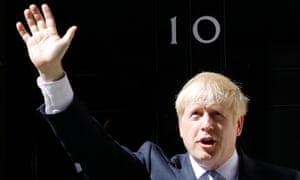The Guardian - Back to home
This is no normal transition of power. It’s a hard Brexit coup
The rise of Boris Johnson marks an unprecedented partisan takeover by the radical wing of the Conservative party
T
he passing of Theresa May and the ascension of Boris Johnson may have appeared to the casual observer as a colourful but nevertheless essentially conventional piece of British political continuity. The public decencies, insofar as such words can ever be used in connection with Johnson, were in place. The dignified but hapless former prime minister departed to the echo of the now traditional round of applause from MPs. The outgoing leader’s car entered Buckingham Palace to the solemn lilt of Huw Edwards’s commentary as her successor waited in the wings to kiss hands. On the face of things, these were the familiar rituals of peaceful transition in British politics.
Yet no one should have been taken in by the show this time. For this is a political transition unlike any other. It is a massive rupture, not a seamless progression. Its outcome is dark-clouded in uncertainty. Any idea that the events of 24 July 2019 embody the same timeless magic of the peaceful passing of parliamentary power that constitutional experts like to celebrate is for the birds. For this is an unprecedented partisan seizure of power by the radical part of the Conservative party that seeks Brexit whatever the cost. It is a hard Brexit coup dressed up as politics as usual.
It is a very particular coup, with very particular implications. It has happened because May failed to deliver Britain’s withdrawal from the EU on terms that command a majority in parliament. Most of that failure was due to the minority of her own party that always wanted a sharper break with the EU. That minority eventually succeeded in its aim of forcing May out after the collapse of Tory support in the European elections. Fear of the Brexit party, along with the connivance of an untrustworthy backbench Tory chair, Graham Brady, sealed May’s fate, to the decisive advantage of Johnson, who was not only the favourite to win but who had thrown in his lot with the party right.
This in itself might not quite justify the word coup. May’s time, after all, was up. But two further factors help to clinch the argument. The first is the time factor. On Wednesday Johnson waffled breathlessly about all the domestic policy changes he intends to make. The reality, though, is that he knows his government has only one task: to deliver Brexit by 31 October. But he has boxed himself in on Brexit. He must choose between a withdrawal deal similar to May’s, which will take time, which the EU is reluctant to concede and which many of his backers and cabinet will oppose, and no deal, which many of his supporters crave, in part because it might destroy the threat from the Brexit party.
Everything suggests Johnson will choose no deal. That is certainly the takeaway from the second factor, the evidence of the new Johnson cabinet. This is an unbalanced cabinet of mostly second-rate ideologues, many of them with negligible records of ministerial achievement and several of them with very dubious political ethics. All the positions of power are held by Brexit extremists. The rest are political hostages to the hard Brexiters.
Johnson is not going to repeat May’s error of allowing his enemies to block his Brexit policy or to destabilise his government by resigning. His new cabinet is an explicit rejection of May’s attempt to hold the Tory party together to deliver Brexit. No deal is thus the logical outcome of May’s overthrow and of Johnson’s victory. But it is not what the nation wants. No deal is opposed both by a majority in parliament, including a significant number of Tories, and by a majority of the public. That is why it is right to call this a hard Brexit coup.
In the 1790s the French revolution was radicalised by reactionary Europe’s war on the new republic. Johnson and the hard Brexiters today are in something of the position that Danton and Robespierre were in then. They have brought their desperation on themselves by what happened under May. To achieve Brexit, they must be audacious. They would prefer emergency politics, not politics as usual.
May’s ousting and Johnson’s victory involve an imposed radicalisation of government not unlike the radicalisation of war. The lopsided shape of Johnson’s cabinet, which met for the first time on Thursday, and the deeply tarnished characters of many of its members from the prime minister downwards, ought to illuminate the huge seriousness of the radicalisation that has been imposed on the country ever since May was forced out.
Britain has its own experience of the radicalisation of government caused by war. In 1916 and 1940 the danger to the nation meant that politics as usual gave way to emergency government. But those radical war governments were national governments, reaching out to other parties, including Labour, in the national interest. Today, though, Britons are not dying on the beaches. They are preparing to go and play on them for the next six weeks.
The Johnson government embodies the exact opposite impulse to those national governments that ruled in war. It rests on a rejection of consensus and cooperation in favour of narrowing of the government’s own party base and of its support in parliament. Not only is Labour not part of this emergency government. Nor are large parts of the Conservative party itself. The majority of Tory MPs and the third of Tory members who did not vote for Johnson are disenfranchised now.
Ordinarily this ought to mean that the Johnson government cannot survive. There are not enough Conservative, DUP and pro-Brexit Labour MPs to give it a majority for what it wants to do. Last week there was a majority of 41against a no-deal Brexit. Next week the Liberal Democrats may win the Brecon and Radnorshire byelection from the Tories. The Tory ranks are full of angry casualties from the Johnson coup. Though the moderate Tories have a poor record of standing up to be counted, it seems inconceivable that this parliament could give Johnson’s Brexit strategy a mandate.
This inescapably puts Johnson on a collision course with parliament. That is precisely why he has taken over as parliament departs for its summer recess, to give him time to govern without accountability. When parliament returns in the autumn, however, there will be nowhere to hide. Johnson may want to govern without parliament. He may have brought Dominic Cummings into his team to help him run against parliament. But in the end, the parliamentary numbers still apply unless and until Johnson takes the risk of trying to change them by calling a general election or, like Oliver Cromwell, he dismisses parliament altogether.
• Martin Kettle is a Guardian columnist
----------------------------------------------------------------------------------------------
My Comments :
Martin Kettle : This is no normal transition of power. It’s a hard Brexit coup
I could not agree more with Kettle, not in the least, when one does compare the comment that I wrote only 5 weeks ago :
"Tory leadership candidates rule out pre-Brexit election in BBC debate – as it happened"18 Jun 2019 10:41Boris Johnson gets fresh boost as Leadsom backs his campaign1. Since the forcefully muted Boris at this stage already, has collected enough votes to potentially win - this inner-circle Tory leadership battle for the outer-circle post of PM - by a landslide, we have to ask the all too legitimate question : Are we really observing a very British coup taking place before our very eyes.!2. A very British coup by the extreme-right ERG I would suggest (ideologically speaking), which doomsday horror-scenario however, in my opinion hardly anybody voted for during the highly ill-advised, highly ill-prepared and highly ill-executed ADVISORY) 2016 EU-UK referendum...
-------------------------------------------------------------------------------
1. Speaking of a (very British) Coup : The democracy factor has never ever been close to the populist theatre that had been referred to as a (ADVISORY) referendum.
2. Not even close, for democracy is all about decision-making on the base of the right (valid) information.
3. This (totally ignored) informative VALIDATING dimension of the 2016 UK-EU decision making process has been even more important, since the decision to be made at the time, has been of an existential nature, meant to be determining the UK social, political and economic future for a number of decennia to come.
4. This self-evidently UK-EU referendum has been a decision that has been taken totally without the proper knowledge-level - because the proper knowledge had either been hidden by the populist pro-Brexiteers, or had been missing altogether, and has been established only AFTER the referendum - so this 'show-trial' could never have been called a democratic decision (making process) in the first place.
5. At this stage of the Brexit debacle, the only thing that can be done, to (more or less) legitimise the (close) outcome of the first referendum, is to organise a second referendum, all over the same subject again.
6. This second referendum however, should be both. a binding referendum and a referendum with a number of qualified majority criteria, such as a. a minimum percentage of voters to come to the ballad box and b. a minimum difference (of say ten percent) between the Remain and Brexit outcome.
7. Having said all that, one can not deny that the devastating effect on the overall moral of the UK people has already been well 'achieved' by the army of hard Brexiteers, because the ultra-nationalist / racist extreme-right has had an enormous boost, and will prosper and relish in that boost for the years to come.
8. In this very respect, I elsewhere already mentioned the organisational effort of the extreme-right activist Stephen Bannon and his like-minded billionaire financiers, who - after having delivered Trump and Johnson on their respective thrones - are frenetically planning for the entire western world to ultimately navigate on the ultra-nationalist White supremacist course.
9. In that world there will be no room for science or international institutions, upholding universal human rights, such as equal rights for everyone on earth and a basic right on a sustainable natural habitat.
10. So the people of good will and good faith, will have to wake up and resolve to resolutely and effectively resist these dangerous trends of autocracy, racism and anti-AGW, to mention just a few of the hazards that the extreme-right has in store for humanity.


Geen opmerkingen:
Een reactie posten
Opmerking: Alleen leden van deze blog kunnen een reactie posten.